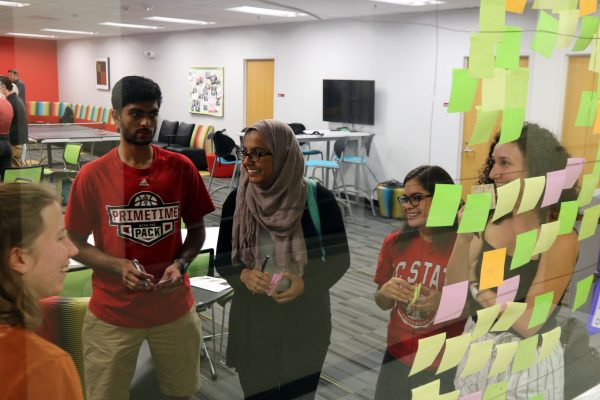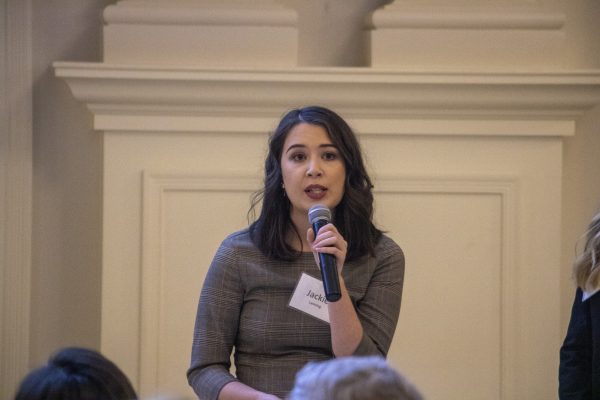Impact Stories
Students from the third cohort of NC State Social Innovation Fellows share some reflections on their experiences in the program. Keep reading to learn about the impacts on their time at the university.
Pridhvi Gadiraju | undergraduate major in biological sciences; Spanish and business minor

“My time serving as a Fellow has been so memorable and truly rewarding. Throughout the year, I have been inundated with valuable information about the ideology of a social entrepreneur. I was captivated by wonderful stories that inspire me to work harder and learn about the ways in which I can impact my community.”
The Social Innovation Fellows (SIF) are one of the most ambitious, thoughtful, and intelligent student bodies I have had the pleasure of working with. Over the course of a year, I witnessed the dedication and leadership required to elicit positive social change in our communities. Along with the exceptionally talented SIF faculty and staff, who are there to support students every step of the way, a host of resources are available to ensure student success.
As a part of the Water in the Fields team, our group strived to innovate and reduce dehydration in the farmworker population. Throughout the project there were many moments where I was overwhelmed by the magnitude of the issue. Farmworkers were not only battling the excessive exposure to sunlight and heat, they were and still are, struggling to prosper under the many burdens our society has placed on them. From unfair policy, to hazardous living conditions, and arduous working procedures, farmworkers face so many setbacks that are simply unjust. How is it that our society has neglected the health and wellness of those who are responsible for the food on our plates? Regardless of how overwhelming the task may seem, I have learned that to create change, to make a difference, we must act together and focus on one step at a time.
I am grateful to the SIF community for instilling the mindset of a social entrepreneur but also for teaching me to be empathetic to the various perspectives that accompany difficult situations. While the work conducted through the SIF program is often serious, has real world consequences, and can be very challenging, I think it’s important to remember to have fun, meet amazing people, and enjoy the journey!
Deepti Chintalapudi | graduate student in industrial systems engineering
“It’s easy to learn about the issues people are facing in the world and feel hopeless, but when you’re in a room full of problem solvers who are motivated to tackle these issues, you develop an everlasting innovative mindset, and that’s what the Social Innovation Fellows program has done for me.”
While starting my journey at NC State as a graduate student in the Industrial Engineering department, I felt the need to feed my restless, problem-solving mind with some action. This drove me to apply to be a Fellow.
What followed was an incredible learning experience, not only about Social Entrepreneurship as a concept, but it also showed me that there are people out there who are really going after the causes they care about. These doers figured out a way to support themselves while – quite literally – helping make the world a better place. From reverse recycling to supporting female artisans that survived trafficking and abuse, they’ve identified problems and devised solutions that not only help solve them, but also help inform the rest of the world about how they can be part of the solution. My experience as a Fellow has been wonderful and has shown me a new pragmatic way of thinking, and I’m excited to use it to fuel my future endeavors.
Olivia Merritt | undergraduate major in fisheries, wildlife and conservation biology; minor in natural resources policy and administration
“Social Innovation Fellows taught me to tackle a problem through a holistic social lens. One of the best activities was using Post-It notes to identify the vision and mission of our venture. Each team did this early on in the program, and the goal is to narrow down an issue to a specific, actionable mission. This activity showed me that to make change, even if the problem is very big, it must be compartmentalized into different feasible actions.”
The Social Innovation Fellows Program isn’t just an extracurricular activity, it is a comprehensive framework of how to change the world. I joined because my passion for sustainability and social justice fit in perfectly with the program’s aim. I was placed in the Water in the Fields team, where the Episcopal Farmworkers Ministry (EFwM) was working on evaluating a water carrier they provided to a group of immigrant farmworkers in eastern North Carolina. I learned about things that had never been touched on in any of my classes: the paid-by-the-piece wage of farmworkers, how this incentivizes them not to take water breaks, and that heat-related illness is a serious danger for this underrepresented group.
My team narrowed down our vision of improving the wellbeing of the migrant farmworkers to a mission of evaluating the water bottle carrier that our venture partner implemented. After further research of our targeted farmworker group, we changed our mission to increasing communication and trust between EFwM and the people they serve. I developed my interpersonal skills, learned of novel ways to work together in groups on issues, and realized the power of social entrepreneurship during my time in the Social Innovation Fellows.
Mariam Shah | undergraduate major in chemical engineering

“The Social Innovation Fellowship at NC State had a profound impact on the way I view current social issues. The Fellowship educates students on what it means to be a social entrepreneur and helps teach new concepts, skills, and ideas that can help implement positive change in all aspects of society.”
One thing I learned through the program is that any change requires trial and error. It requires entrepreneurs to narrow down the bigger problems into smaller key issues that can be easily tackled.
As part of the Water in the Fields Project, my group worked on providing access to water for farmworkers working in long, hot hours in the sun. Migrant farmworkers are some of the most marginalized groups in the country. Our personal research and the work done by the Episcopal Farmworkers Ministry helped us understand the lack of resources available for the community and the daily struggles faced by farmworkers. This allowed us to create garments that can be used to protect farmworkers from the sun. We also created a research survey that will allow the Ministry to study into the community and further narrow down the issues that farmworkers face and how we all can better assist them.
The Fellowship is an excellent program for anyone who is passionate about any social justice issue. It provides hands on experience and a great pathway for future social entrepreneurs to make a positive change in the world.
Jackie Lanning | undergraduate major in biological sciences; minor in international studies
 “Being a social change leader is more than making the largest impact; it is having intention about how a project fits into the bigger picture.”
“Being a social change leader is more than making the largest impact; it is having intention about how a project fits into the bigger picture.”
The Social Innovation Fellows program challenged my preconceived ideas about social change. Often social change is seen as physical actions: protests, passing legislation, developing new tools, etc. The SIF program revealed that those visible actions are only a part of the long process of social change. Changemakers dedicate hours to learning, questioning, and discussing an issue and its contexts.
My team and I had the opportunity to work with OurWave, an anonymous online platform for survivors of sexual assault to practice healing through storytelling. At first, our team thought we had our project decided in the first month of the program and were ready to jump in. Through the different SIF workshops, we mapped out the issue, its stakeholders, and the broader work of activism around sexual assault. The time we took to take a step back was necessary for us to understand how OurWave could fit in the broader vision of ending sexual assault. We felt compelled to change our project focus and, as a result, do more meaningful work that would push social change forward.
I learned how messy the work of social change is but, through the program, I gained the tools to slowly untangle the mess. I am grateful for this first-hand experience that has transformed my approach to social change.
